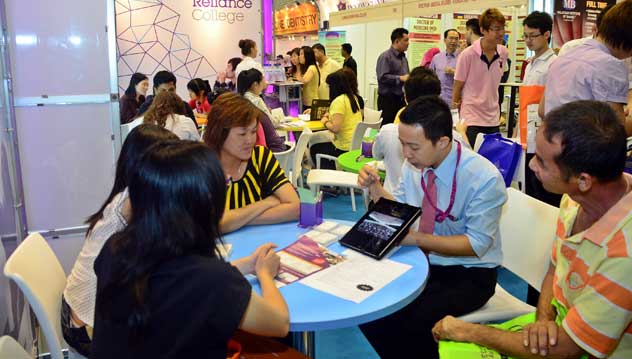
It’s that time again. No, this isn’t an early warning about filing your taxes. It’s a reminder that this is one of the busier periods for post-secondary students to attend their school’s job fairs.
Some job fairs have already been held, but there are plenty of others. Today there’s a summer job fair for George Brown students at the Casa Loma campus, and tomorrow Centennial College is holding a fair for community services students — ECE, paramedics, police foundations, developmental services, and so on.
It should be noted here that job fairs are different from career fairs in that career fairs provide information and a chance to talk to those already working in fields students may be considering, rather than jobs.
Generally, the advice colleges offer students attending job fairs is to be prepared if they want to get the most out of their attendance.
That means paying attention to the obvious, and being properly dressed is top of the list, says Kathleen Winningham, manager of co-op and employment resources at Centennial College.
“We really recommend (students) dress as if it were a job interview,” she says.
That’s sound advice, but not always heeded. Winningham points to one example where a student showed up at a job fair held in her residence in her pyjamas.
Bob Eichvald, manager of career services at George Brown College, agrees with Winningham. “Dress appropriately. That’s a classic and we discuss that all the time.”
No smoking
Beverley Stevens, career services co-ordinator at Seneca College, is also big on dressing for the occasion, and suggests students who smoke shouldn’t light up before they go to a fair.
Both Stevens and Winningham recommend a short set speech about themselves — Stevens calls it “an elevator speech” — that they can trot out when they speak to potential employers. Students can also help themselves by bringing along good listening skills, Stevens says, but can do themselves untold damage by displaying the wrong attitude. She recognizes that job fairs are stressful and tiring, but if it means getting hired then the effort was worth it.
As well as showing a positive attitude by exhibiting confidence, poise and enthusiasm, students should also move around the fair solo. “Don’t travel in a pack with your friends,” Winningham says.
Students should also research the companies coming to the fair, or at least those they want to talk to. The Internet is the best place to start the research process.
George Brown College is holding a job fair at the end of February with speakers and discussion panels for students with disabilities, Eichvald says. In March, there’s another fair for the college’s fashion students and another event in April called Career Launch for graduating students that is designed “to get them prepped,” he continues.
A fair of a slightly different sort was also held at George Brown last fall and again in January. Eichvald says a regional program adviser from Citizenship and Immigration Canada came to answer questions international students had about obtaining visas, working while studying and staying in Canada following graduation.
The number of exhibitors at college jobs fairs varies, but Winningham says a program-specific fair might attract 30 employers, while another that has several related disciplines under one roof can bring 50 to 100 exhibitors. And last fall at Centennial, 80 employers attracted about 1,000 students to a job fair.
Job fair quick facts
– Job fair attendees should dress professionally.
– Some employers at job fairs appreciate receiving a portfolio from students.
– Multiple copies of a resume are a must.
– Some basic research before the fair is invaluable.
– Take a positive attitude to the job fair.
